Forecasting COVID-19 impact on RWI/ISL container throughput index by using SARIMA models
Citation
Koyuncu, K., L. Tavacioğlu, N. Gökmen, and U. Ç. Arican. 2021. "Forecasting COVID-19 Impact on RWI/ISL Container Throughput Index by using SARIMA Models." Maritime Policy and Management. doi:10.1080/03088839.2021.1876937.Abstract
Maritime operators are facing their biggest challenge called Coronavirus (COVID-19) since the 2008 financial crisis. As part of the measures taken by the countries against the virus, the domino effect started with the breaks in the interconnected supply chain, like the spider web. The main purpose of this study is modeling the Institute of Shipping Economics and Logistics (ISL) and the Leibniz-Institut für Wirtschaftsforschung (RWI) Container Throughput Index with the time series, to reveal the relationship between the short-term forecast results and the COVID-19 seen in the first months of 2020. The deep effect of COVID-19 on maritime trade is investigated by forecasting the RWI/ISL Container Throughput Index in 89 major international container ports, including and excluding seasonal variations. The
modeling process of the Seasonal Autoregressive Integrated Moving Average (SARIMA) and Exponential Smoothing State Space Model (ETS) is explained. To evaluate SARIMA and ETS models’ performance, information criteria, and error measurements are calculated and compared. SARIMA model is found as more suitable model than ETS forecasting seasonally and working-day adjusted and original RWI/ISL. The results indicated that the SARIMA model is suitable and efficient for the forecasting of RWI/ISL. Three months’ forecasting results are showed that the decrease will continue.


















